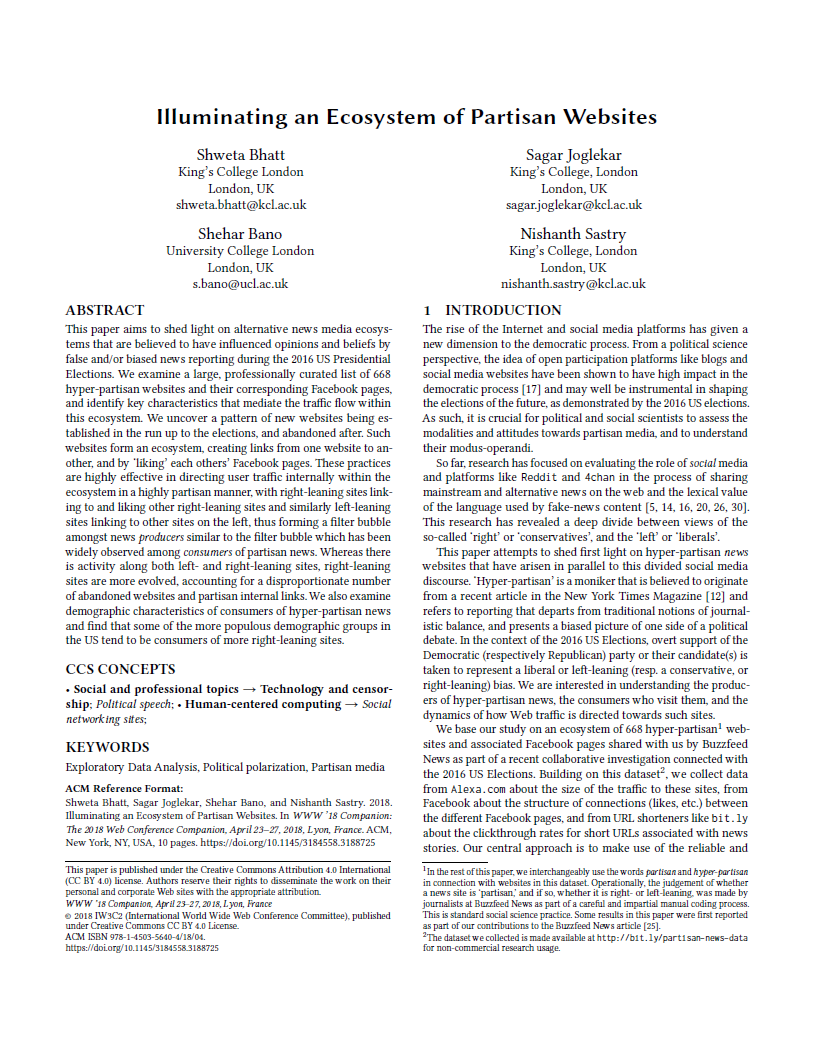Illuminating an Ecosystem of Partisan Websites
Abstract
This paper aims to shed light on alternative news media ecosystems that are believed to have influenced opinions and beliefs by false and/or biased news reporting during the 2016 US Presidential Elections. We examine a large, professionally curated list of 668 hyper-partisan websites and their corresponding Facebook pages, and identify key characteristics that mediate the traffic flow within this ecosystem. We uncover a pattern of new websites being established in the run up to the elections, and abandoned after. Such websites form an ecosystem, creating links from one website to another, and by `liking' each others' Facebook pages. These practices are highly effective in directing user traffic internally within the ecosystem in a highly partisan manner, with right-leaning sites linking to and liking other right-leaning sites and similarly left-leaning sites linking to other sites on the left, thus forming a filter bubble amongst news producers similar to the filter bubble which has been widely observed among consumers of partisan news. Whereas there is activity along both left- and right-leaning sites, right-leaning sites are more evolved, accounting for a disproportionate number of abandoned websites and partisan internal links. We also examine demographic characteristics of consumers of hyper-partisan news and find that some of the more populous demographic groups in the US tend to be consumers of more right-leaning sites.Partisan News Dataset
An anonymized version of the Partisan News dataset used in our paper is being made available to the research community. If you are interested in using this data, please send us an email according to the Request Data section and indicate which of following parts you need in the email.
Buzzfeed Dataset: In XLSX and CSV format, contains list of partisan websites and associated Facebook pages data
-
Augmented Dataset: In JSON format contains traffic patterns and engagement metrics from Alexa, Facebook and Bitly
You can find the format of the dataset from here.
Contact Us
If you are interested in using this data, please fill the form to to get the link where you can download the data.
We are sharing the dataset under the terms and conditions specified here (link). Please note that submitting the form indicates that you accept the terms and conditions of the data. In the form, please indicate which part of the dataset you need. If you do not get any email notification for your logged request within 24 hours, please e-mail us at netsys.noreply[at]gmail.com.Dataset Terms and Conditions
You will use the data solely for the purpose of non-profit research or non-profit education.
You will respect the privacy of end users and organizations that may be identified in the data. You will not attempt to reverse engineer, decrypt, de-anonymize, derive or otherwise re-identify anonymized information.
You will not distribute the data beyond your immediate research group.
If you create a publication using our datasets, please cite our papers as follows.
@inproceedings{www2018bhatt,
title = {Illuminating an Ecosystem of Partisan Websites},
booktitle = {WWW '18 Companion: The 2018 Web Conference Companion, April 23--27, 2018, Lyon, France},
author = {Bhatt, Shweta and Joglekar, Sagar and Bano, Shehar and Sastry, Nishanth},
year = {2018},
address = {Lyon, France}
}
